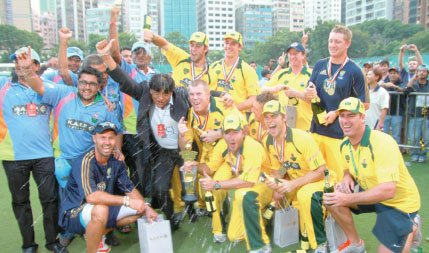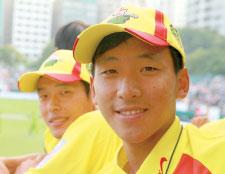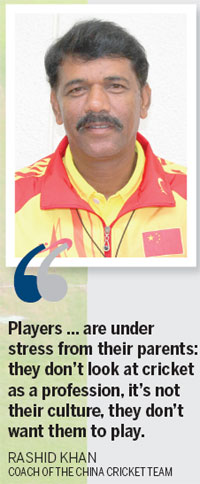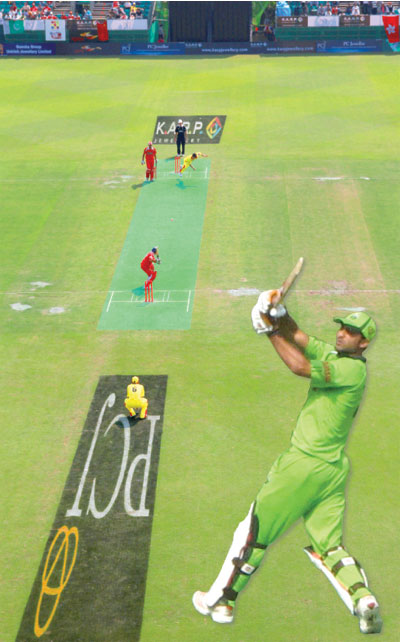|

Australian cricket players celebrate after winning an international cricket tournament. Provided to China Daily |
It's been a slow process but the game of cricket has slowly been making inroads in Hong Kong and on the mainland - just in time for the inaugural of the sport in this year's Asian Games. Daniel Pordes reports.
It is conceivable that a one-run defeat has never been more celebrated. The crowd cheer wildly for the beaten team; the sidelined players are on their feet applauding, and the losing yet triumphant captain salutes the crowd with his bat held high and a wide smile on his face.
The Chinese mainland team, unranked by the International Cricket Council - has come very close to beating a strong developmental senior team from Hong Kong, ranked 24, on its own turf.
"This is really the beginning for China; the day they showed that China's cricket future is very bright."
Those are the words of an ecstatic Rashid Khan, the former Pakistani international player who helped bring cricket to China, and in just a few years got the team ready from scratch for this month's Asian Games in Guangzhou. Cricket will be contested at the Asian Games this year for the first time.
|

Players of the China Cricket team. Provided to China Daily |
In October 2006, the Pakistan cricket board asked Khan to go to China on behalf of Pakistan, an opportunity he felt he could not refuse. Having already coached Pakistan U-19, the PCB Patron's XI, PIA and Karachi Harbour sides with considerable success, he saw the goal of developing cricket in a foreign country as a new challenge.
"The status was zero when I arrived. No one knew about it, no one had played it. The Asian Cricket Council had held level zero coaching courses - and those coaches had never even heard of cricket before," Khan recalled of his first days in China. "In those days, the boys were standing to bat in a baseball style, the closest thing to cricket they knew," he added, as we sat on the terrace of the Kowloon Cricket Club in Hong Kong. It was the day before the match against Hong Kong Development.
Enlisting a group of 20 former softball players from a school in Shenzhen because of their familiarity with the closest comparable sport, Khan was able to teach them the basics of cricket stances, positioning and footwork. Working with the nucleus of this group for two years, Khan was hopeful of significant progress when disaster struck.
"When they reached the senior grade at high school, their headmaster said no more cricket at school. Two years wasted," Khan said bitterly.
One of those players, opening batsman Zhang Yufei, kept up the sport under the coach's guidance. Zhang now is one of the leading players on the national team.
Chinese schools' indifference to the sport has not been the only obstacle Khan has had to overcome. Graduation from school and university brings pressure from Chinese families who see no future in the little-known sport.
"Players in the women's and men's teams are under stress from their parents: they don't look at cricket as a profession, it's not their culture, they don't want them to play," Khan said ruefully. "I spent a lot of time developing a spin-bowler, but then he quit cricket."
The culture clash is something that recently appointed Hong Kong coach, Australian Charlie Burke has also experienced when dealing with local players.

"If you talk to a lot of Chinese people here in Hong Kong they will say cricket is a foreigner's game. That's how it has been in the past, so it's a fair comment," Burke said. "It's tough because it's work not sport that means everything to people here; it's a six-day week! It's hard for the young kids here to manage the amount of pressure they get from parents and schools to study. There are so many distractions from the game, totally different to my culture in Australia."
The precedence placed on studies and jobs over what is considered a minor sport among Chinese is not really a surprise. What is more startling is the commitment and passion shown by those who choose to play it. Khan spoke with pride of Mei Chun-hua, whose devotion to the sport led her to quit her insurance job in 2008 where she was making "a lot of money" to focus on cricket. Her commitment paid off, and she is now the captain of the women's national team. Burke spoke of Li Kai-ming, 19, who bowls 10 overs (sixty times) every day, because he's so eager to train and improve.
However, things are getting better. Over the last two years Khan has observed a discernible change. Asian Games organisers have built a 12,000-seat cricket stadium at the Guangdong University of Technology to host the tournament. The ACC has targeted China as the major new market for development of the sport. Moreover, designated sports universities have provided Khan with a regular stream of talent, in particular schools in Linhai in Zhejiang province, Shanghai Tongji University and Shenyang Sports University in Liaoning province. The latter is home to several players including national team captain Wang Lei, 25, who took part in the invitational match against Hong Kong.
While China has had disappointing results, being thrashed by the Maldives in the 2009 ACC Trophy Challenge and making a last-place finish in the 2009 ACC Twenty20 Cup, Wang is unperturbed and looks forward to the Asian Games.
"Right now, it's important to play games, the result is secondary. Other countries have had many years of history in this game; we've just had three or four years," Wang said. "We're determined to learn and develop, already we have grown so much. This team is unrecognizable from how it was two years ago."
Hong Kong too has moved forward over the last 10 years in involving its Chinese population, with Danny Lai's appointment in February 2002 as the first Chinese general manager of the Hong Kong Cricket Association (HKCA), a show of intent.
"As of nine years ago we have targeted local Chinese schools for development, including setting up a playground league," Lai said. "We have since trained thousands of young Chinese kids, even if they don't go on to play at least they have built up some awareness of the sport."
One beneficiary of the HKCA's renewed focus on local Chinese is Justin Liu, whose grandparents are from Guangzhou. At 17, he is already involved in the Hong Kong men's senior team and has toured with them to Papua New Guinea. A member of the development team that narrowly beat the mainland team, Lui felt the right moves were being made by the HKCA.
"This development team is a first step towards getting more locally born or Chinese players involved," Lui said. "I'd like to keep playing cricket for as long as I can, my goal is play for the Hong Kong team in the Sixes."
Although Lui narrowly missed out on a place in Hong Kong's final squad for the Asian Games, his teammates Li Kai-ming and vice-captain Roy Lamsam, 30, will join Wang Lei and Rashid Khan in taking part in the games.
The games are the perfect opportunity to show not only their country, but also the world that the Chinese play cricket too.

(HK Edition 11/16/2010 page4)